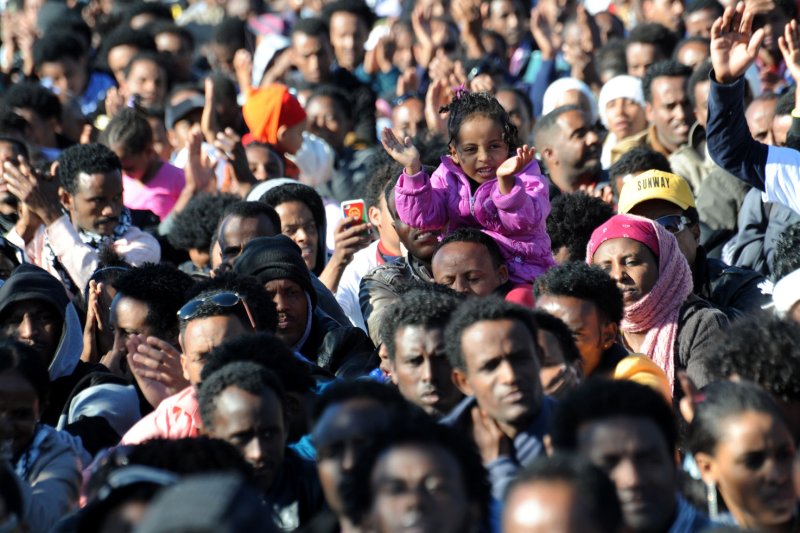1 of 4 | African asylum seekers protest against Israel's refusal to grant them refugee status outside the Knesset, Israel's Parliament, in Jerusalem, Israel, January 8, 2014. Tens of thousands of African migrants called on Israel to recognize them as refugees and stop a law that allows the authorities to keep them in an open ended detention center in southern Israel. (UPI/Debbie Hill) |
License Photo
WASHINGTON, June 20 (UPI) -- The United Nations has recognized June 20 as World Refugee Day since 2001 -- the 50th anniversary of the 1951 Convention relating to the Status of Refugees.
On this year's World Refugee Day, the U.N. refugee agency reported a shocking increase in the number of forcibly displaced. It said that "the number of refugees, asylum-seekers and internally displaced people worldwide has, for the first time in the post-World War II era, exceeded 50 million people."
In total, 51.2 million people were forcibly displaced by the end of 2013, up from the 45.2 million reported in 2012. That number equates to the population of a medium-to-large country.
U.N. High Commissioner for Refugees António Guterres believes the solution is political.
"The international community has to overcome its differences and find solutions to the conflicts of today in South Sudan, Syria, Central African Republic and elsewhere."
The conflicts in Afghanistan, Syria, and Somalia account for the largest percentage of refugees. In Syria, one-third of the country's population has been displaced.
UPI spoke in February with Amin Awad, who directs UNHCR's Middle East and North Africa Bureau and coordinates Syrian refugee operations.
Half the population of Syrian refugees -- as with other refugee groups -- is under the age of 18, making children a top priority. Awad notes that in order to protect the future of this young generation, "The number one challenge is that children are missing out on school."
"They need to continue their education but of course, along with that, or maybe before that, they need psycho-social support because of trauma. Children, as you know, are the number one sector of the population that gets affected by flight, by violence, by bombing, even the sound of it really traumatizes them. So we have a traumatized population. They need education. The youth also need not only education but activities to engage in. Among these children are some that are separated from their parents. We have a lot of separated children that we are in the process of tracing parents and guardians with ICRC [International Committee of the Red Cross] and other organizations."
That concern led to UNICEF's No Lost Generation initiative, which seeks to help Syrian children by protecting them from abuse and violence, and providing them with education and skills.
Awad described the challenges faced by relief workers attempting to help Syria's internally displaced. Security and access, he said, are the biggest challenges inside Syria.
"In 2013, we shifted our emphasis to non-governmentally controlled areas, assisting IDPS. But that doesn't mean we are satisfied with that. There are some places that are not accessible to us, what we call -- besieged areas or hard to reach areas. ... Access to these places is a challenge in itself. You come across dozens of checkpoints and you don't know who's who. Security and access are our number one challenges inside Syria."
Awad echoed High Commissioner Guterres' remark that conflict-torn countries must come up with political solutions to bring about peace and resolve the refugee crisis. But with Syria, he acknowledged, that process may take a long time.
"We came to the conclusion that this [Syrian] conflict will be protracted. There is no political settlement in sight. ... If we judge by similar conflicts in recent history, like the Balkans, it takes five, six, seven years to come up with a solution." Because of the long-term projection, UNHCR shifted to long-term assistance.
According to Awad, long-term assistance is multi-faceted and includes shifting from in-kind assistance to cash so that refugees have more autonomy meeting their own needs, focusing on development and rehabilitation, and working with host-countries on burden sharing.
"Refugee relief is expensive. To meet the growing needs, non-traditional donors need to step up alongside traditional donors," Guterres wrote in UNHCR's Global Trends report.
World Refugee Day aims to raise awareness about the 51.2 million people who have been forcibly displaced across the world. UNHCR launched a social media campaign to "support families torn apart by war and share their stories," asking the public to share the following message on Twitter:















